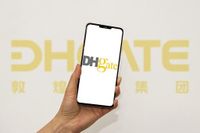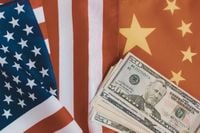In a surprising twist amid the ongoing U.S.-China trade war, the Chinese e-commerce app DHgate has skyrocketed to the top of the U.S. App Store rankings, reflecting a significant shift in consumer behavior and awareness. As of April 14, 2025, DHgate surged to become the No. 3 top free iPhone app in the U.S. App Store, a remarkable leap from its previous ranking of No. 352 just days earlier.
This surge in popularity can be attributed to a viral trend on TikTok, where Chinese manufacturers have begun revealing the secrets behind luxury goods production. These videos, often referred to as 'Trade War TikTok,' expose how many items believed to be high-end European products are actually made in China. For instance, one viral clip claimed that a Hermès Birkin bag, typically sold for around $39,000, costs just about $1,400 to produce. This revelation has prompted consumers to rethink their purchasing decisions and consider alternatives like DHgate, which connects buyers directly with Chinese manufacturers.
On April 12, 2025, DHgate recorded 35,400 downloads across the App Store and Google Play, marking a 56% increase from its 30-day average. Notably, U.S. downloads accounted for 17,300 of those installs, a staggering 98% increase over the previous month. The following day, downloads surged even further, with 117,500 installs on iOS alone, up 732% from the 30-day average, and 65,100 of those coming from the U.S., reflecting a 940% jump.
DHgate, which offers an inventory of over 30 million products ranging from electronics to apparel, has positioned itself as a viable option for consumers looking for cheaper alternatives to luxury brands. The app has gained traction as TikTok users share insights about the realities of global manufacturing, highlighting how many luxury items are sourced from Chinese factories before being branded and sold at inflated prices in the West.
One TikTok user, who created a video that went viral, stated, "There’s nothing a Chinese factory can’t make," showcasing various products allegedly produced for well-known brands such as Brooks Brothers and Tommy Hilfiger. This kind of content has resonated with viewers, encouraging them to explore platforms like DHgate where they can purchase similar items for a fraction of the price.
As the U.S. government has increased tariffs on Chinese imports by 145%, many Chinese suppliers have turned to social media to counteract the negative perceptions associated with these tariffs. The videos serve not only as marketing tools for DHgate but also as a form of resistance against the trade policies that have impacted their businesses.
In the backdrop of this surge, other apps like Taobao have also seen increased interest, climbing to No. 10 on the U.S. App Store. This trend highlights a growing consumer shift towards direct-to-consumer platforms that connect buyers with manufacturers in China, bypassing traditional retail channels.
Despite the potential benefits of using DHgate, consumers should remain cautious. While the app offers access to a wide range of products, the challenge lies in distinguishing between authentic goods and replicas or 'dupes.' Online communities, such as the r/DHgate subreddit, provide guidance for users trying to navigate this complex marketplace.
The implications of this trend extend beyond individual consumer choices. As TikTok users continue to expose the realities of luxury goods production, a broader conversation about the value of branding and the ethics of consumerism is taking shape. Videos detailing how leggings costing £3.90 ($5) can match Lululemon's £78 ($100) pairs challenge the notion of luxury and exclusivity.
As the trade war continues to evolve, the landscape of e-commerce is also shifting. The recent rise of DHgate illustrates how global events can drive changes in consumer behavior, particularly among younger generations who are increasingly turning to social media for information and shopping.
In conclusion, the ascent of DHgate in the U.S. App Store is a fascinating case study in how digital platforms can rapidly gain traction through viral trends and changing consumer perceptions. As more people become aware of the realities behind luxury pricing and manufacturing, the demand for alternatives like DHgate is likely to continue growing, reshaping the future of shopping in the process.









